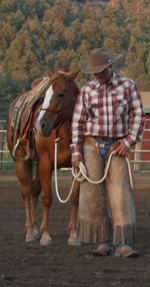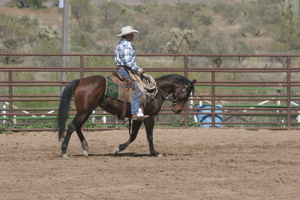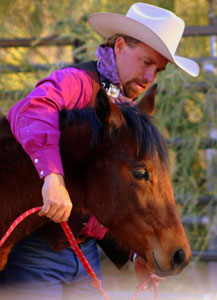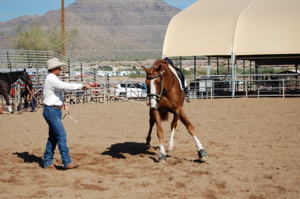
Paul Dietz is a humble horseman and not "just another" horseman/clinician. Paul's knowledge of horses is exceptional and he is gifted with communication and teaching skills reaching far beyond the average and into the handful of "top professional" horsemen today. He has figured out what he does best and is doing it: teaching people on a very personal level about the incredible journey that can lead to a oneness between horse and rider; developing an effortless, soft connection, the thoughts of the horse and rider becoming one and ultimately leading to directing the horses feet. Paul is in touch with the internal, invisible intent a true horseman must have which initiates the connection between horse and human before any external moves are evident.
Paul rode with Buck Brannaman when he was just 14 years old. Even as a young teen Paul was sensitive to how Buck's horses behaved, " more with him and less distracted ," comments Dietz. Paul did everything he could to ride as often as possible with Buck. His exposure to this horsemanship resulted in a commitment to work with horses for a better change, not only in the horses but also within himself. In time it became clear to Paul that the horses were a mirror of who you are as a person, good or bad as it may be, and that they don't lie. As a result Paul began to change his focus for himself and the type of person he wanted to be. Greatly influenced by Buck eventually the relationship evolved into a 3-year internship with him traveling the country and learning from thousands of horses. That close handed work with Buck, as well as learning from others such as Ray Hunt and Tom Dorrance, proved the foundation and path for refinement of Paul's own horsemanship skills and style.
Horses were always Paul's connection to his real self. They were the only vehicle that allowed him to break through his shyness barrier finding peace and comfort without effort in their presence. Initially, teaching was difficult for Paul but slowly and with small groups he began to let go of Buck and Ray's teaching styles and allow his own to develop. His gift became evident and now can be partially defined by his use of vivid analogies bringing the language of great horsemanship into everyone's realm of understanding. In this way he can articulate the invisible concepts, the intent we have for our horses that is so essential to the partnership we desire as well as teach about the "little things" which mean so much to them.
Paul offers his students a feel, a soft connection, first between himself and his students and then between those students and their horse. "A feel that is effortless can connect with the mind, feet and body of a horse", says Paul. This is essential to slow down, speed up, move the feet forward, back, right and left as well as up or down. This freedom of movement is essential to any discipline. "It is really nice to show people another way of handling horses, more suiting to the horse," comments Dietz, "the horse was not born to carry the load. It isn't natural. I try to teach not just good horsemanship but great horsemanship for both the rider and the horse." Without great horsemanship "problems with a horse are one accident away from people getting hurt. Everyone wants to get along with his horse but sometimes they do things not to get along. They get so focused on the end result they are trying to achieve that they don't see the problem."
Paul was invited to ride in the Tom Dorrance benefit in Ft. Worth, hosted by Ray Hunt, and there he was encouraged by a prominent influential to share his ideas and talents publicly by presenting clinics. He had something special to offer. That encouragement, as well as his own feeling that the teaching being offered today was not sufficient, led Paul to begin traveling the country to share his knowledge of horses. He developed his own style which includes a personally developed format combining a balance of group time, private time, and personal time all within the confines of a clinic presentation.
Paul is based in Phoenix, AZ, but offers large and small clinics from coast to coast as well as demonstrations. His clinics are geared toward the ability and interests of the participants. He doesn't have a preference about whether the participants use English or Western saddles or what discipline they prefer. There isn't a discipline that doesn't involve moving the horses' feet. Paul directs the learning process creating the environment for understanding the importance of that control and how to achieve it effortlessly. Only with that control can we hope to hold the key to timing, placement and direction essential for the job at hand.





Paul Dietz is a humble man. He finalizes his teaching sessions by asking with interest and compassion, "How can I be a better teacher ?" And he means it.
Paul Dietz can be contacted at (602) 680-7176 or (623) 742-7285.
Enjoy the journey,
Paul Dietz
© 2009-2014. www.pauldietzhorsemanship.com
602-332-5038
Facebook • www.myspace.com/pauldietzhorsemanship